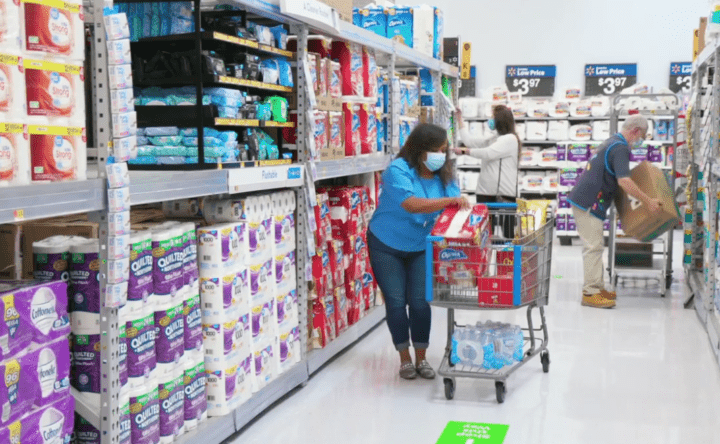
Big-box stores like Walmart and major online retailers like Amazon are able to negotiate with their suppliers to keep prices low and pass those savings onto customers. But where does that leave smaller retailers that don’t have that kind of negotiating power?
It leaves them forced to charge higher prices and offer their customers a smaller selection, according to an industry group – and the coronavirus pandemic, it says, is only making things worse.
The National Grocers Association, a trade group representing the independent supermarket industry, is calling on Congress to “investigate the unchecked power of big box stores and e-commerce giants,” which they say “have used their influence during the pandemic to further disadvantage independent grocery stores and the communities they serve.” Unless lawmakers and regulators act, the NGA says, shoppers across the country will be forced to pay the price.
“Independent grocers have been feeling the financial squeeze from these anti-competitive tactics for years, and the pandemic has brought these illegal tactics to the kitchen table of every American,” NGA CEO and President Greg Ferrara said in a statement. “As families struggle under the weight of the pandemic, the dominant food retailers are squeezing suppliers and as a result, forcing higher prices and fewer products on independent grocers and their customers.
The NGA lays out its argument in a new 24-page report entitled “Buyer Power and Economic Discrimination in the Grocery Aisle.” America’s approximately 21,000 independently-owned and operated grocers, the report reads, “are the true entrepreneurs of the grocery industry.” But they’re “constantly losing ground to a handful of dominant retailers, to the disadvantage of both consumers and local communities.”
Large corporations like Walmart and Amazon are able to use their scale and influence to get preferential treatment from their suppliers, the NGA argues. “Suppliers are forced to extend discounts and other advantageous terms to the dominant retailers and make up for their losses by charging higher prices to other buyers,” like smaller independent grocers, the report reads.
Oftentimes, the wholesale prices that independent grocers are charged is higher than the retail prices charged by their competitors. In that case, it’s more cost-effective for independent grocers to just buy products from Costco or Sam’s Club, mark them up, and sell them in their own stores – which the NGA says is exactly what some of its members are forced to do.
And that’s become particularly true over the past year – not just concerning the cost of products, but the availability of products as well. “Many independent grocers have struggled throughout the pandemic to stock must-have products — such as essentials like paper towels and toilet paper, cleaning supplies, and critical packaged foods like canned soup — while large national chains have exercised their buyer power to demand on-time, complete orders, and in some cases to secure excess supply,” the report reads. It goes on to quote one group of sellers as saying that “Amazon’s hold over sellers effectively took food from the shelves of neighborhood grocery stores… and moved it to Amazon’s own warehouses.”
As a result, “consumers lose access to lower prices at their local grocers,” the NGA says, “and in many cases lose access to must-have products from local grocers entirely.” Particularly hard hit are shoppers in rural and urban areas served by independent grocers, who have been “forced to travel longer distances to find products they need at more crowded large chain retailers.”
Federal antitrust laws were designed to address these very issues, the NGA argues. So it’s calling for Congressional hearings, a Federal Trade Commission investigation, and legislation if necessary to put an end to anti-competitive tactics in the grocery industry.
“Congress has to stand up for local businesses and consumers to demand an end to these harmful tactics and restore a competitive marketplace that benefits the economy and grocery shoppers alike,” Ferrara said.
So if you would prefer shopping at your local grocery store, were it not for the lower prices at Walmart or Amazon, the NGA is looking for some federal help to create a more even playing field. Otherwise, the group warns, when it comes to where you buy your groceries – you may not have a choice.
Image source: Walmart















